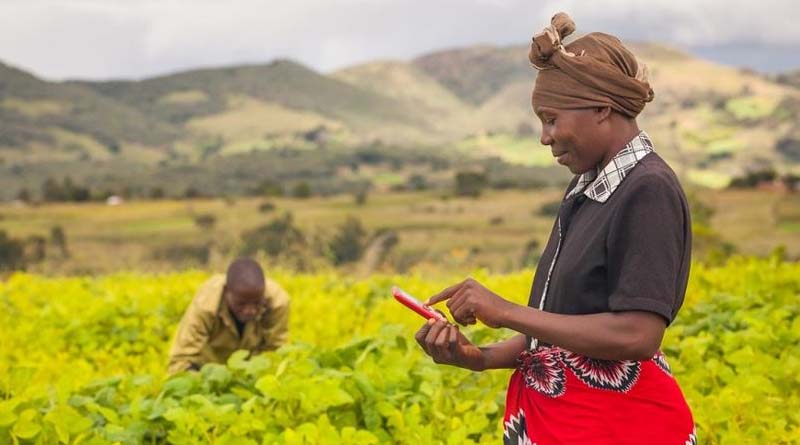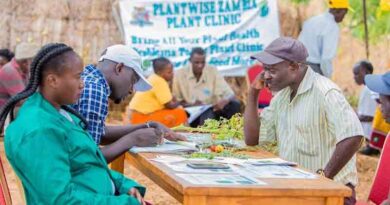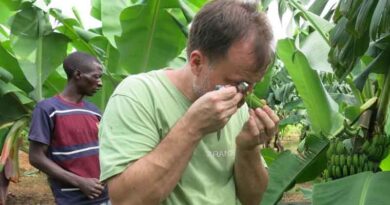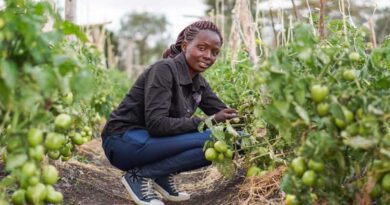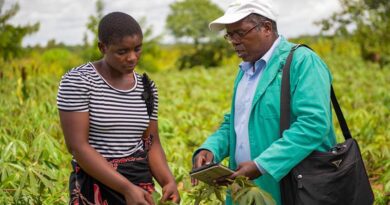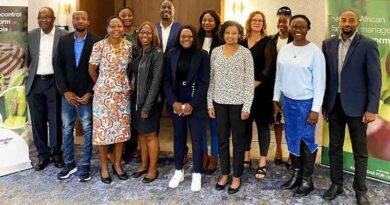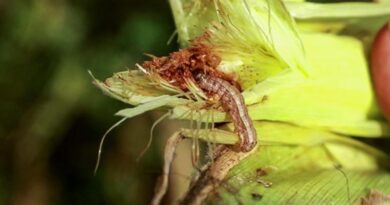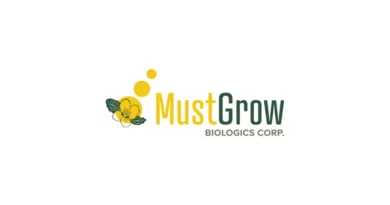CABI-led study shows benefits of chatgroups to human health can be replicated in plant health
20 March 2024, Ghana: A CABI-led study has revealed that there is evidence of the benefits of chatgroups to human health which can also be replicated in plant health.
The research analysed the opportunities and pitfalls of using chatgroups for plant health systems and examined the conditions for strengthening chatroom functions. It also considered the possibility of replicating reported successes in healthcare settings to plant health systems.
The scientists from CABI, who were joined by colleagues including from the Knowledge, Technology and Innovation group at Wageningen University and the University of Lusaka, Zambia, focused their attention on chatgroup usage under the Plantwise programme in Ghana, Kenya, Uganda, and Sri Lanka.
Benefits can be replicated in plant health
Dr Dannie Romney, an author of the research – which was published in CABI One Health journal – and who is Senior Global Director, Development Communication and Extension, said, “Our findings show that there is evidence of the benefits of chatgroups to human health which can be replicated in plant health.
“Replication should however not be a ‘copy and paste’ approach. This is due to the general lack of evidence-based guidelines and lessons learned to move beyond the initial adoption success of communication applications.
“Also, in practice, Plantwise plant doctor chatgroups are generally much larger than groups in healthcare settings and it remains to be seen whether increasing chatroom activity could benefit specific plant health objectives; or whether it would lead to increased labour costs, and/or diminish the participation of plant doctors.”
The aim of the CABI-led PlantwisePlus programme, which is building on the successes and learning of Plantwise and Action on Invasives programmes, which have already helped millions of farmers in over 30 countries diagnose and treat pest threats and reduce crop losses by strengthening national plant health systems.
PlantwisePlus bridges the gap where at the national and regional level there is no consistent or coordinated mechanism for detection of and response to pest outbreaks, or for providing the technical support needed to identify plant health problems and deliver effective solutions.
It draws upon a range of existing CABI open access products and projects. These include the CABI BioProtection Portal – a free tool to enhance the awareness and uptake of biocontrol and biopesticide products by growers and advisors – and the Plantwise Knowledge Bank and factsheet app.
Posting behaviour was seen to vary amongst plant health professionals
The researchers found that, in general, posting behaviour was seen to vary amongst health professionals and similar variations in participation were also observed with plant clinic networks. Higher levels of active participation were reported amongst younger members (20-39 years-old) and those with less than 10 years professional experience.
Between 2017 and 2019, for example, the proportions of participants remaining relatively silent in the plant clinic chatgroups were 37-48% in Kenya, 50-52% in Ghana, and 35-58% in Uganda. In Sri Lanka, participation was more variable across years and groups – though it rarely fell below contributions from 30% of participants in any particular year – although this didn’t mean that the remaining participants were not following exchanges.
In Ghana, during a series of plant doctor trainings in 2019, participation increased with only 22% of chatgroup participants being silent members. Furthermore, surveys conducted in Ghana show that differences in participation in plant clinic chatgroups in the country were attributable to the topics being discussed.
Hierarchy was also a factor with junior members more reluctant to post in groups that also included senior staff.
Chatgroups often revolved around several central figures
Co-author of the study, Anna Wood, who is also an Integrated Crop Management Advisor at CABI, said, “Another observation from all the plant clinic chatgroups is that interactions within chatgroups often revolved around several central figures; either diagnostic experts, experienced extension agents or chatgroup facilitators.
“We also find that smaller chatgroups in Africa were noted to encourage greater participation, with plant doctors stating that small chatgroups helped shy members to connect and reach out to others. In Uganda, Ghana and Kenya, smaller plant clinic online groups, that usually represent a particular geography (district, province etc.) or training cohort, operate alongside a national group.”
Manju Thakur, co-author and Knowledge Bank Coordinator at CABI, added that In Sri Lanka, there are only nine provincial groups and no national groups. All these groups are official, but observations were made that smaller groups were more homogenous in terms of members, less formal with more social exchanges and focused on logistics.
Larger, national groups were more heterogenous
In contrast the larger, national groups were more heterogenous, allowing access to broader expertise, but more formal and focused on knowledge exchange including addressing queries.
“This agrees with insights from healthcare settings with Pahwa et al 2018 showing that small groups encourage greater interaction; and Zhang et al 2013 who showed that large chatgroups may be less efficient with active participation declining as the group size increases.”
The researchers argue that, over time, in the plant health chatgroups, it was observed that although the number of requests for diagnostic support decreased over time, the quality of diagnostic support improved.
In addition, it was also reported that the proportion of cases where conflicting or incorrect diagnoses were given also declined. As in healthcare settings, the sharing of images across plant doctor chatgroups is critical in identifying and diagnosing pests and diseases, they said.
Increased cohesion amongst plant health network members
Dr Romney said, “Emerging evidence from the four countries involved in the plant clinic network shows that the benefits observed in human health chatgroups are also emerging in plant health. The simplification and improvement of interactions across vertical chains of communication resulted in increased cohesion amongst plant health network members.
“Additionally, the sharing of uncommon symptoms in plant clinic chatgroups was also observed to contribute to early detection and rapid response systems by raising awareness of potential outbreaks and rapidly sharing information on the correct identification of pests and diseases and on how to manage the problem.
“Most notably chatgroups improved the ease of communication in sharing information with plant doctors and in linking plant health experts in urban settings with those in rural isolated areas – resulting in improved and timely diagnosis.”
Also Read: Best Agrolife’s Patented Product ‘Defender’ to Be Available for Indian Farmers From May 2024
(For Latest Agriculture News & Updates, follow Krishak Jagat on Google News)

